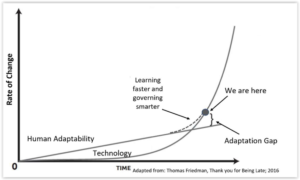In the rapidly evolving landscape of business, the imperative for effective process governance has never been greater. As organizations navigate digital and cultural transformations, a robust understanding of process governance can significantly enhance their success rates. With accelerating changes, allowing people to be creative and to contribute with their individual talents is essential for thriving organizational ecosystems. To transform at both the individual and organizational level requires dynamic decision making to allow for sustainable change and an optimal flow of value to stakeholders. Process governance is the cornerstone for sustainable organizational performance as we shift towards Industry 4.0 and Industry 5.0 paradigms1.
The Critical Role of Process Governance
“Everything flows” – Heraclitus (ca. 535 – 475 BC)
Most organizations strive to improve their core business processes by introducing new functionalities, refining steps, or integrating new technologies. These efforts typically yield short- term gains but fail to sustain long-term change, as they do not foster a creative workforce— a gap in addressing the people and cultural dimensions. A McKinsey study from 2022 illustrates this point by revealing that only “12 percent of transformation programs sustain their performance gains beyond three years”. The study emphasizes the often-overlooked “people side of productivity, performance, and technology”, which requires a human-centered approach to truly achieve operational excellence.2
“Cultures that don’t position every employee as an innovator will rapidly fall behind. We are all creatives now.” – Gabriella Rosen Kellerman & Martin Seligman3
The Evolution of Governance
Process governance ensures that business processes do not stagnate but evolve in alignment with organizational goals and technological advancements. This evolution is crucial for maintaining the agility needed to effectively respond to market changes and customer demands.
Thomas Friedman highlights the urgency of this evolution in his book, “Thank You for Being Late,” where he describes how technological advancements are surpassing our capacity to adapt. He argues that organizations must embrace flexibility, innovation, and a culture of continuous learning to thrive in this era of rapid change.4

“We need to move from a ‘know-it-all’ attitude to a ‘learn-it-all’ attitude.” – Satya Nadella5
Integrating People in Process Governance
Business Process Management (BPM) provides a framework that proposes a cultural shift from traditional hierarchical structures to democratized process management. This shift is crucial in an era where conventional command-and-control management styles are increasingly inadequate. Instead, there is a growing need to reimagine organizational structures that promote adaptability, creativity, and innovation.
Some best practices of effective process governance include formal structures (such as joint stakeholder objectives and cross-functional process owner roles) and more informal mechanisms (fostering informal cross-functional groups)6. This holistic approach is critical for supporting the processes necessary for future success.
Some very forward-looking organizations are paving a new path experimenting with purpose-built teams, more autonomy and strong emphasis on learning. Researchers looking at Google and other progressive companies conclude: “We believe that the organizations of the future will need to be people-centric, hyper learning organizations that fuse the best technologies and the best human learners to excel at innovating to meet the needs of its stakeholders.” – Edward D. Hess & Katherine Ludwig7
The BPM Governance Mandate
BPM governance is indispensable as it focuses on creating value for stakeholders, understanding the interconnectedness of processes, and empowering workers. This empowers organizations to develop more self-directed and autonomous teams within a dynamic and networked framework rather than a rigid hierarchical structure.
Adopting BPM practices is not a panacea; it requires a gradual development of a process mindset, cooperation, and the collective redesigning of new processes. This iterative process challenges traditional management practices and requires them to evolve to fit the vision of a modern, human- centered organization. And this has been my personal experience throughout my career: initial success with very tangible and impressive gains in performance, followed by an inability to budge organizational strategy and management structures. This compromised the transformational journey and led to slow decay of these initiatives.
Conclusion: Crafting a Future-Proof Organization
The strategic integration of process governance into an organization’s DNA is essential for thriving in today’s dynamic business environment. By fostering a culture that values continuous improvement, innovation, and accountability, organizations can more effectively navigate the complexities of digital transformation. Thomas Friedman’s caution that the pace of technology can outstrip our adaptive capacities underscores the need for governance frameworks that are as flexible and innovative as the technologies they aim to harness. The future belongs to those who understand that process governance is not about maintaining control, but about enabling a creative, adaptive, and learning-focused organization poised for long-term success.
Featured Self-Assessment
Take the BPM Skills Self-Assessment now
Featured Certificate
Learn more about the BPM Specialist Certificate and training by BPMInstitute.org
Featured Course
Learn more about Governance & Centers of Excellence
References
1 Industry 4.0 refers to the integration of automation and data exchange for smart manufacturing and intelligent factories. Industry 5.0 focusses on collaboration between humans and machines.
2 McKinsey & Company (Colotla, Fookes, Iverson, Schaefer, Sellschop and Wijpkema) “Today’s good to great: Next-generation operational excellence”, Operations Article, January 19, 2004
3 Gabriella Rosen Kellerman & Martin Seligman, “Tomorrowmind”, Atria Books, 2023
4 Thomas Friedman, “Thank you for Being Late: An optimist’s guide to thriving in the age of accelerations”, Farrar, Straus and Giroux, 2016.
5 From Michael Bunting, “Vertical Growth – how self-awareness transforms leaders and organizations”, Wiley, 2023
6 Corporate Executive Board (now Gartner), “Rebuilding the Process Value Chain – focusing on process governance, not perfecting processes”, Operations Council, 2010
7 Edward D. Hess & Katherine Ludwig, “Humility is the New Smart – Rethinking Human Excellence in the Smart Machine Age”, Berrett-Koehler Publishers Inc. (2017)

















